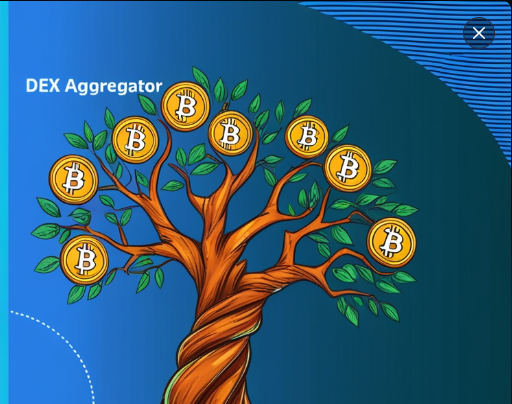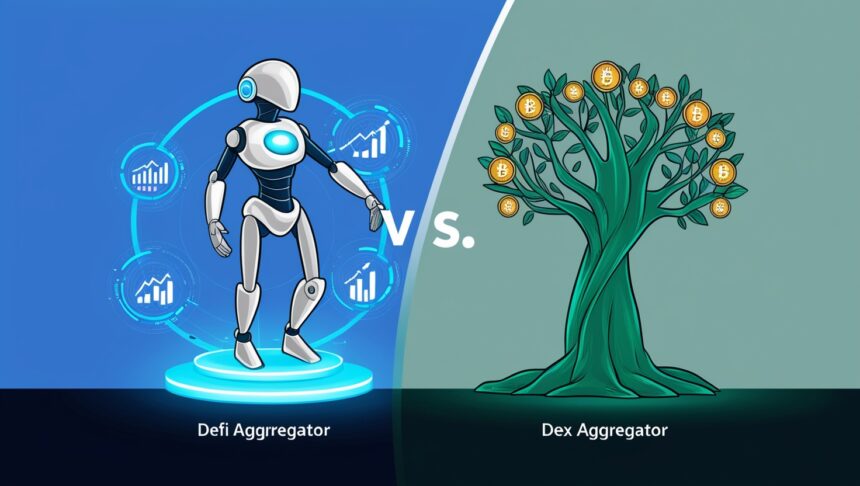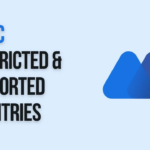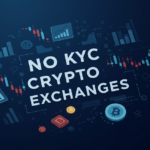In this article, I explore the DeFi Aggregator vs. DEX Aggregator. Despite both tools aiming to enhance user experience in the decentralized finance sector, each tool meets a different requirement.
While DeFi aggregators concentrate on retrieving the maximum value from different DeFi protocols, DEX aggregators facilitate the exchange of tokens on different decentralized exchanges, ensuring optimal pricing and minimized fees.
What Is DeFi Aggregator?
A DeFi aggregator is a platform that brings together various services for lending or borrowing in decentral systems, all within an interface through which the user can access.

It searches multiple DeFi protocols for the best rates available for lending, borrowing, staking, and token swapping.
Furthermore, it saves time as well as reducing the transaction cost, while at the same time returning optimally due to trade execution from multiple sources.
What Is DEX Aggregator?
A DEX aggregator gathers liquidity from numerous DEXs to provide users the most optimal prices on token exchanges.

It avoids trading on a single DEX so as to optimize its efficiency by breaking down orders across a number of platforms to reduce slippage and trading costs.
Moreover, it improves trading efficiency and affordability compared to default methods when dealing with large or complicated token exchanges.
DeFi Aggregator vs. DEX Aggregator
| Feature | DeFi Aggregator | DEX Aggregator |
|---|---|---|
| Function | Aggregates services like lending, borrowing, staking | Aggregates decentralized exchanges for token swaps |
| Main Goal | Maximize yield and optimize DeFi operations | Find best price and reduce slippage in token swaps |
| Protocols Involved | Aave, Compound, Yearn Finance, Curve, etc. | Uniswap, SushiSwap, Curve, PancakeSwap, etc. |
| Assets Managed | Lending assets, liquidity pool tokens, staked assets | Mainly focuses on tradable tokens |
| Cross-Chain Support | Often supports multiple DeFi protocols across chains | Frequently includes cross-chain swaps with bridges |
| Optimization Focus | Yield farming, interest rates, staking rewards | Best swap rates, gas efficiency, and minimal slippage |
| User Experience | Comprehensive dashboard for DeFi activities | Simple swap interface with best price routing |
| Examples | Zapper, DeFi Saver, Zerion, Instadapp | 1inch, Matcha, ParaSwap, OpenOcean |
How Does Work DeFi Aggregator?
A DeFi aggregator with the use of sophisticated algorithms sequentially searches through multiple decentralized finance protocols to locate the best rates and features tailored to users’ needs.
As an example, when you want to lend, borrow, or swap tokens, the aggregator analyzes offers at various platforms including Aave and Compound, or even Yearn Finance.
Subsequently, it executes your transaction using the optimum route, allowing you to minimize gas fees while receiving higher returns—all through a single interface.
How Does Work DEX Aggregator?
The working of a DEX aggregator is based on examining many decentralized exchanges (DEXs) simultaneously to identify the best offers and the least slippage for token swap transactions.
The aggregator divides or allocates your order among various DEXs like Uniswap, SushiSwap, or Curve for optimal execution. This improves trade efficiency, cost effectiveness, user experience, and system performance as a whole.
Types of DEX aggregators
Following are the primary subclasses of DEX aggregators:
Multi-Chain Aggregators – Facilitate trading across different blockchains (e.g., 1inch, Paraswap)
Cross-DEX Aggregators – Access liquidity from multiple DEXs on the same chain (e.g., Matcha, DexTools)
Gas Optimization Aggregators – Concentrate on lowering gas fees for swaps (e.g., OpenOcean)
Slippage-Minimizing Aggregators – Cater to slippage of large orders or for volatile trading (e.g., Slingshot).
Types Of DeFi Aggregator
Single-Chain Aggregators – Operate on a single blockchain and aggregate multiple DEXs on that chain. This includes Uniswap and SushiSwap on Ethereum.
Cross-Chain Aggregators – Integrate bridges and multiple networks to enable trading across different blockchains. One example would be 1inch or OpenOcean.
Gas Efficient Aggregators – Strive for the bare minimum of spending money on blockchain transactions during token swapping (e.g. ParaSwap).
Slippage-Optimized Aggregators – Build algorithms that operate with great care to lessen the negative impact of price changes, primarily focusing on large-volume trades (e.g., Matcha).
DEX Aggregators Features
Optimal Trade Rate Comparison
This feature allows DEX Aggregators to analyze rates across various exchanges, ensuring trades are executed at the most economical price.
Maintained Order Matching
To avoid price slippage, particularly during large volume exchanges, DEX aggregators construct orders across different exchanges.
Transaction Cost Efficiency
Some aggregators utilize routes which lower transaction fee expenditures, thereby economizing gas spending.
Multi Blockchain Trading
A majority of DEX Aggregators allow users to exchange tokens on different blockchains, enabling the swapping of tokens on various blockchain networks.
Trade Execution Speed
With DEX Aggregators, users can enjoy fast execution, as trades are routed through the most optimal paths, enhancing user experience.
Access to Liquidity Pools
They grant access to pools containing significant liquidity from numerous DEXs, enhancing trading efficiency and cut down slippage.
DeFi Aggregator Features
Yield Aggregation
Aggregators interface users with different protocols within the DeFi ecosystem by providing the best opportunities both for lending, staking, and liquidity providing.
Single Gateway Multi-Protocol Access
Users can access several protocols, eg. Aave, Compound, Yearn Finance through a single interface, therefore enhancing user experience.
Active Investment Management Strategies
Some aggregators provide active management strategies for the users such as automatic yield compounding to increase returns.
Risk Management Strategies – Most aggregators provide additional tools that help the users evaluate the risks within the scope of DeFi to protect the user’s portfolio.
Chain Agnostic Support
Several DeFi aggregators allow multi-chain operations that let users work with different chains using different assets.
Cost Effectiveness
Users benefit from reduced transaction fees as a result of the liquidity aggregation alongside optimization of gas fees when interacting with the protocols within the DeFi ecosystem.
Dynamic Portfolios
Some platforms dynamically adjust portfolios automatically by reallocating stocks as per the changes in the market.
Pros & Cons Of DEX Aggregators
Pros:
Enhanced Trade Execution: The ability of DEX aggregators to optimize order routing guarantees swift and dependable execution of trades.
Access to Untapped Tokens and Coins: They enable individuals to gain access to tokens that may not be available on a particular DEX, thus increasing the scope of trade.
Preservation of Decentralized Nature: DEX aggregators enable users to make use of various services without losing access to decentralized exchanges.
Better Token Price Consistency: The pooling of liquidity from different DEXs makes it easier to stabilize the price of tokens as compared to smaller exchanges.
Cons:
Congestion at Peak Traffic Times: DEX aggregators may experience backlog in processing orders at the height of traffic due to congestion on numerous exchanges.
Issues with Compatibility: Some DEX aggregators might face problems with certain wallets or tokens, hindering users’ choices.
Concerns Over Privacy: Users may be required to give more information across different platforms which may pose some privacy issues.
Security Risks – The risk of using an aggregator is determined by the weakest DEX in its network. One exchange’s vulnerability can place the entire platform at risk.
Fees from Multiple DEXs – Although an aggregator may save on gas fees, users may still pay additional fees from the DEXs associated with the trade, depending on the platform.
Pros & Cons Of DeFi Aggregator
Pros:
Enhanced Returns – Through the use of DeFi aggregators, users can access available opportunities on different platforms, which help them in getting higher returns for staking, lending and liquidity providing.
Compounding Interest Production – Most aggregators provide investment strategies which enable self-compounding of investments, which in turn increases returns.
Portfolio Expansion – Since the investments are made on many different platforms through DeFI aggregators, this reduces the risk exposure to a single protocol.
Decrease in Transaction Fee – By gathering liquidity from various venues, users are able to save a lot of money from high transaction costs and slippage.
Cons:
Overwhelmed Users – New Users – The aggregated number of DeFi protocols can prove to be a little too much for new users, especially when a large number of interfaces are integrated.
Smart Contract Security Vulnerability – The usage of smart contracts in DeFi aggregation exposes the funds of users to severe risks due to bugs.
Fees for Nonfreemium Platforms – The DeFi aggregators that are not free and charge some fee could impact the returns of the business hard.
Changes in Asset Value Due to Economic Changes – Users bear the brunt of industry wide economic risks and in changes to the assets beyond the volatility associated the DeFi Protocols.
Conclusion
To sum up, both DeFi aggregators and DEX aggregators provide distinct features that cater to different requirements in the world of cryptocurrency.
While DeFi aggregators connect users to the most advantageous yield farming, staking, and lending opportunities for optimal returns across different protocols, DEX aggregators center their attention on fetching the best token swap rates by pooling liquidity from several decentralized exchanges.
Knowing which benefits—maximizing investment options in DeFi or improving efficiency in trading—are most important with regard to each component will assist users shape their approaches and strategies in the decentralized finance world.









